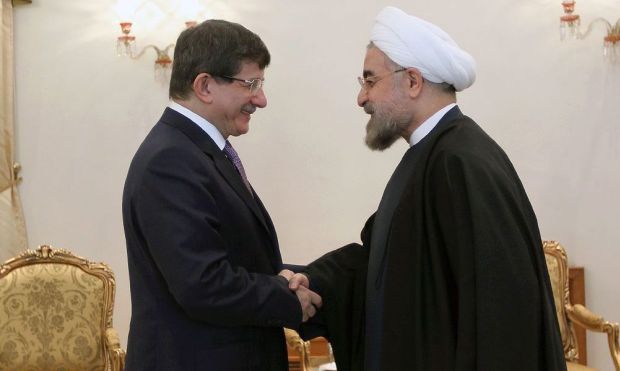
A handout picture made available by the official website of the President of Iran shows the president, Hassan Rouhani (R), greeting Turkish Foreign Minister Ahmet Davutoğlu at the presidential office in Tehran, Iran, on November 27, 2013. (EPA)
Istanbul, Asharq Al-Awsat—Ankara and Tehran reached agreements on bilateral cooperation in several fields, including the Syrian crisis and Egypt, this week during Turkish Foreign Minister Ahmet Davutoğlu’s visit to the Iranian capital.
In a joint press conference in Tehran, Iranian Foreign Minister Mohammad Javad Zarif and his Turkish counterpart issued a joint call for a ceasefire in Syria. Their call came amid hopes that the much-delayed Geneva II peace conference, now scheduled for January 22, can reach a political resolution to end the conflict in Syria.
“Iran and Turkey have similar standpoints on several issues, including the view that there is no military solution to the Syrian crisis,” Iran’s Mehr News Agency quoted Zarif as saying.
Speaking exclusively to Asharq Al-Awsat, Turkish foreign ministry spokesman Levent Gümrükçü said that Ankara and Tehran have agreed to “develop bilateral ties . . . and cooperate to defuse the crisis and stop the bloodshed in Syria.”
Asked when a formal joint ceasefire plan will be issued, Gümrükçü said: “Not yet, but the two sides will work, each according to its own special means, to investigate the possibility of encouraging the opposing sides in Syria to agree a ceasefire.”
The latest rapprochement between Turkey and Iran comes after relations had cooled following Ankara’s criticism of embattled Syrian president and staunch Iranian ally Bashar Al-Assad.
Speaking to Asharq Al-Awsat on condition of anonymity, a high-level Turkish diplomat said that relations between Ankara and Tehran will see more positive developments in the future.
The source confirmed that Turkey and Iran have agreed to do everything in their power to halt the violence in Syria and encourage the opposing Syrian sides to reach a peaceful solution that can “provide the Syrian people with the stability and security they deserve.”
The source added that both President Rouhani and Turkish Prime Minister Recep Tayyip Erdoğan have agreed to put aside their differences on Syria and ensure that this does not impact their relationship.
The diplomatic source sought to play down the diplomatic crisis that ensued between Tehran and Ankara over Erdoğan’s criticisms of Assad, highlighting the common ground between the two countries.
The source also highlighted the “prominent role” played by Turkish Intelligence Chief Hakan Fidan, adding that he had facilitated communication and rapprochement between the two countries over the situations in Egypt and Syria.
In exclusive comments to Asharq Al-Awsat, Ali Hussein Bakeer, a researcher at the Ankara-based International Strategic Research Organization (ISRO), said: “There have been strenuous attempts by Iran and the US to win Turkey over to their side in exchange for facilitating some of the difficulties facing the country.”
According to Bakeer, by opening up to Turkey, Iran is trying to isolate the Arab Gulf States and obtain “Sunni” cover for its nuclear deal, which many believe could serve to extend Tehran’s influence in the region.

Trackbacks/Pingbacks